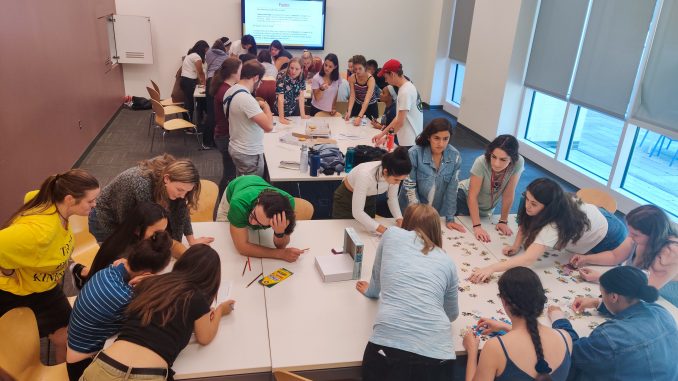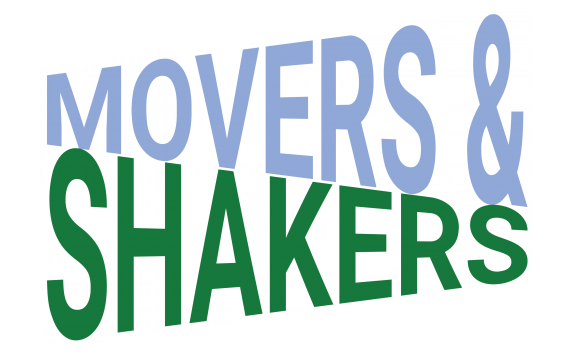
In August 2019, Mia Stavarski was invited to a general body meeting for Active Minds at Temple University. As someone who’s dealt with depression and anxiety, she was interested in a club promoting mental health awareness.

“Going to a club that kind of understands, you know, I guess like, understands that not everything is going to be okay all the time and that you need to take time for yourself and, you know, learn how to care for yourself, that’s what I really enjoyed,” Stavarski, a junior art therapy major and president of Active Minds at TU said. “And then a position opened up and I went for it.”
As president of Active Minds at TU, Stavarski is responsible for running executive board meetings, laying out expectations for executive board members each semester, setting a schedule for general body meetings, fundraisers, and events, meeting with the organization’s faculty advisor, and assisting executive board members with completing their tasks.
Stavarski keeps the organization’s data and documents in check and ensures that the organization’s engagement, marketing and internal teams have enough funds, said Michelle Chan, a junior marketing major and vice president of Active Minds at TU.
“She’s such a good leader for the whole club,” Chan added. “She really knows how to get things done, but also like, accommodate people if needed, and she’s really empathetic.”
Active Minds hosts biweekly general body meetings on Thursday nights that may be informational, like a presentation from the Wellness Resource Center about stress, or more related to self-care, like doing a puzzle together, Stavarski said. There is also time for members to have casual conversations with each other about their overall well-being and how their classes are going, she added.
Active Minds at TU is a chapter of the wider Active Minds network, although the national chapter is not financially responsible for Active Minds at TU. The national chapter serves as a facilitator for the Temple chapter and they both share a code of ethics and responsibilities, like nondiscriminatory practices and ensuring members’ safety and comfort, Stavarski said.
College students have a habit of joking about rarely sleeping or scarcely eating, but Active Minds wants to emphasize that jokes and actions of this nature are not healthy, Stavarski said.
“We need to take care of ourselves a little bit more, especially in college when, you know, this time is just so stressful and riddled with challenges,” she added.
When Chan and another vice president had to step aside from the organization to deal with personal issues, Stavarski was able to continue operating as usual, Chan said.
“She, yeah, basically was like, running everything with like, less help as usual and didn’t complain at all, which is I think it’s something to look up to,” Chan said.
As an aspiring art therapist, Stavarski wants to use art to communicate with people in a way that extends beyond conversations.
“For the future, I just want to help people kind of grow and help facilitate that growth away like, you know, my therapists have helped me,” she said.
Stavarski’s skills as a listener make her a great leader, said Madelyn Phillips, a junior pharmacy major and Stavarski’s friend since 2018.
“She absorbs what you say, she processes it, and she responds to you,” Phillips said. “And it feels very personal, it feels like she really knows what’s going on,”
Stavarski improved the organization by suggesting a resource list of mental health support and sending a self-care package to executive board members, she said. The list includes resources at Temple, like links to CARE Team and the Wellness Resource Center, as well as coping techniques, disability resources, LGBTQ mental health resources and mental health resources for people of color.
“Now more than ever, people kind of realize what mental health is and kind of the necessity of taking care of yourself is just because I feel like, going online, we’ve started to struggle a lot,” Stavarski said.
About 85 percent of the students surveyed in a study conducted in Spring 2020 reported high to moderate levels of distress, according to PLOS One.
In her mental health advocacy, Stavarski is the most proud of her volunteer work as a crisis counselor with the Crisis Textline, an organization that supports individuals undergoing mental health crises.
“People have like considered suicide and I’ve helped them kind of calm down, and you know like, reconsider and, hopefully, to not follow through with it for that day,” she added.
Despite operating virtually, Stavarski and her team have fostered an environment where students feel comfortable discussing topics outside of the group’s focus through the course of this year, she said.
“It’s the fact that we made something so like, comfortable, and we fill up so much rapport with like, the students that feel comfortable talking to us,” Stavarski added. “That’s what kind of makes me proud.”


Be the first to comment